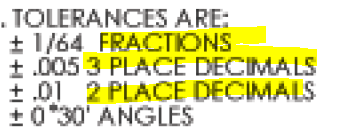After that, I've already had 0.5 rays tolerance +/- 1 ... convenient to avoid machining ![]()
That's how you end up with products made in PRC that don't fit together with the EU gear ![]()
But, don't you have an image capture to show us of your tolerance 5 +/-3?
Because you're talking to us about
which would mean an angle of 5 seconds +/-3 minutes (even more inconsistent ^^)
In short, a direct reading of the map can help answer you
@coin37coin Given the character behind the apostrophe, I think it's a typo, that he wanted to type 2 apostrophes to write inches. This formats the text with arrows.
For me, a +3 rating is to be interpreted 0/+3. Note that in a drawing, a tolerance applied to a particular dimension cancels the general tolerance and only applies to this dimension (of course). In this case, everything is in inches (plane dimensions + general tolerance) otherwise we can't get out of it.
In the case of 5"0/+3 this may possibly be an accepted overlength, why not!!
Re bonjour gaithbenhamouda,
Here's what might help you =>

and that =>https://fr.eurotools.eu/dictionnaire-des-termes/les-bases-de-la-norme-de-tolerance-generale-iso-2768-mk/
Good luck.
@+.
AR.
It smells like hazing this shot ![]()
I saw the plan and it's
3.000 +5
.375 +3
A ±2
B ±3
C +10
…
Since not all values below 0 show zero, I thought that the tolerances could actually be ±0.3, and +1.0 but 0.375 ±0.3 would not make much sense.
Hello again Maclane,
No, no indication of " Standard ".
Thank you
Yes, this document has been making me laugh for 20 years!
Probably because I recognize myself a little too much in it!
Well, more or less to a pinch of iotta, or to a cow's tail!
Even if it won't help our friend @gaithbenhamouda much, I couldn't miss the opportunity to pull this pifometric standard out of my hat!![]()
The improved French version here:
https://abcelectronique.net/forum/attachment.php?attachmentid=84368
Chances are it's not that far away.
Hello
Having worked with an American company, the ANSI and ISO ratings are quite different.
Quite often in the USA, the number of digits gives the applicable tolerance.
So if there is 3.0" on the plan you will have a wide tolerance but if it is 3.000" it will be a tight tolerance.
In my opinion, the excerpt of the map you shared is incomplete: there must be missing information to the left or right of this table.
Like this:

If the table at the bottom of the plan is not more explicit than what is displayed, I would opt for:
3.000 + 5 → 3" +0 / +0.005"
0.375 + 3 → 0.375" +0 / +0.003"
If A is given with 3 digits after the decimal point +/-0.002 if it is given with 2 digits: +/- 0.02
It immediately makes more sense. ![]()
I wasn't that far away.